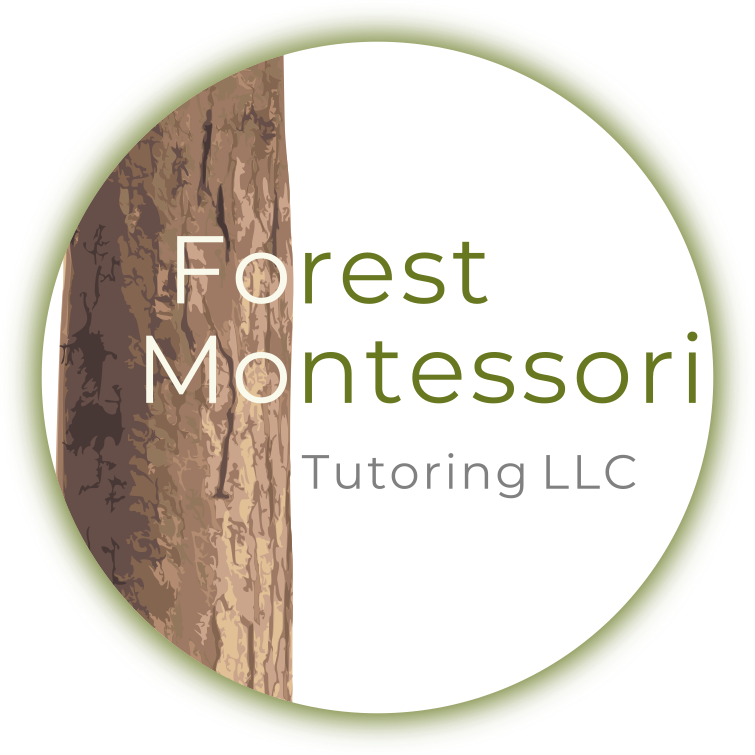
“When we try to pick out anything by itself, we find it hitched to everything else in the universe.“ — John Muir
Our Philosophy
Childhood is a precious time to be savored, not rushed. At Forest Montessori Tutoring, we help children grow strong, kind, and curious by spending meaningful time outdoors. We aim to create space for kids to slow down, get muddy, fine-tune their senses, and — most importantly — have fun. We believe that connecting with nature fosters healthier bodies, calmer minds and more grounded hearts. We aim to make tree-climbing, bug-watching, and creek-wading a normal — and necessary — part of childhood again.
Benefits of Outdoor Forest Play
There are many overlaps between Montessori learning and outdoor forest play. Our optional Friday play sessions create a unique experience for both children and their families.
Engagement and Motivation
- Intrinsic Motivation: Without the external validation of grades, children are engaged deeply in interest-led activities that are sparked and sustained by their own intrinsic motivation. They become active agents in their own learning and enjoy the process of learning for its own sake, both in the classroom as in the forest.
- Real-World Connections: Learning in nature connects academic concepts to the real world. Children can see how science, math, art, and language are all connected to the natural world, making learning feel more relevant and exciting and thus leading to long-term (Spanish) language retention.
Environmental Stewardship
- Responsibility: Both Montessori learning and outdoor forest play cultivate a sense of responsibility and care for the environment. As children spend time playing outdoors, they develop a deeper appreciation for nature. This relationship with nature is expanded upon in the classroom as children study the interconnectedness of all living things.
- Critical Thinking about Nature: Nature education encourages children to observe, analyze, and ask questions about the world around them. They learn about ecosystems, weather patterns, plant life, animals, and more, fostering a sense of environmental stewardship from a young age.
- Cultural Awareness: Children learn about indigenous knowledge and traditional ecological practices. This helps build respect for different cultures and provides a deeper understanding of how people have lived in harmony with nature for generations.
- Sense of Place: Children develop an essential, but often overlooked aspect of their identity: a sense of “place”. This sense of connection to the land — the local flora, fauna, and geography — can enhance their sense of identity and community.
Physical Development and Health
- Physical Health: Spending time outdoors encourages physical activity, fine motor skill practice, and risk assessment which are essential for healthy development. Climbing, running, jumping, and exploring new terrain help build strong muscles, bones, and coordination while collecting leaves, digging in soil or building with natural materials help children develop hand-eye coordination and dexterity.
- Boosted Immune System: Being outside exposes children to different microorganisms which helps strengthen their immune systems.
- Better Sleep: Physical activity and exposure to natural light during the day help children develop healthier sleep patterns, leading to better rest and overall well-being.
Cognitive Benefits
- Attention Control: At a time when people’s attention spans are shortening by measurable amounts each year, unplugging not only feels gratifying in the short term, but research shows that it improves attention and concentration by reducing mental fatigue, skills that are also exercised in the classroom.
- Critical Thinking: Our outdoor forest play encourages critical thinking, problem-solving, and flexible thinking. Whether it's figuring out how to balance on a rock or figuring out how to use natural materials for a project, children develop problem-solving abilities that can be applied in other areas of life.
- Curiosity and Exploration: Nature is inherently intriguing, which sparks children's curiosity, fosters a love of learning and develops a scientific mindset.
Summary
While on the surface, Montessori and outdoor forest play may seem disparate methods of learning, they share deep roots in respecting the child, fostering independence, building concentration, self-awareness and a collaborative mindset. They both emphasize child-led learning through hands-on experience and nurture well-rounded, resilient and curious learners.
Social and Emotional Development